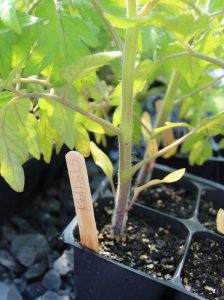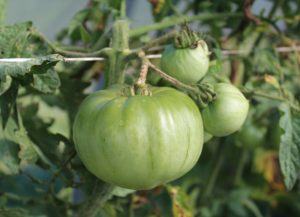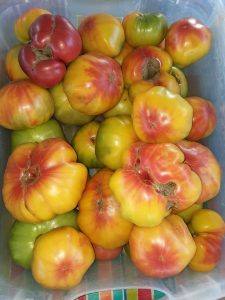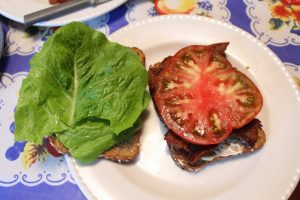

They took a plough and plough’d him down,
Put clods upon his head,
And they have sworn a solemn oath
John Barleycorn was dead.
But the cheerful Spring came kindly on,
And show’rs began to fall;
John Barleycorn got up again,
And sore surpris’d them all.
from “John Barleycorn: A Ballad” by Robert Burns
The grower of trees, the gardener, the man born to farming,
whose hands reach into the ground and sprout,
to him the soil is a divine drug. He enters into death
yearly, and comes back rejoicing. He has seen the light lie down
in the dung heap, and rise again in the corn.
from “The Man Born to Farming” by Wendell Berry
“The farms and the flocks endure, bigger than the life of a single person. We are born, live our working lives, and die, passing like the oak leaves that blow across our land in the winter. We are each tiny parts of something enduring, something that feels solid, real, and true.”
from The Shepherd’s Life: Modern Dispatches from an Ancient Landscape by James Rebanks

I have learned a lot of practical skills during this season as a F.A.R.M. intern. I can identify all kinds of insect pests and know what to do about them (squishing, mostly). I have learned proper picking and washing techniques for different vegetables. I can transplant seedlings and set up drip tape. I have a stack of templates for farm business financial planning. I can make change at market without a calculator.

But it’s the other things I’ve experienced, the quieter things, the intangibles, that have made this experience most meaningful for me. Most of these things seem to be tied into the seasonality of work on a small, diversified, organic farm. In our modern world, it sometimes feels like the only seasonality to our lives is whether they are selling candy canes or Cadbury eggs at the drugstore. I didn’t realize it before, but when I spent all of my working time indoors and on the computer, I was divorced from the natural passing of time. My desk job was pretty much the same year-round. I have loved being outside and experiencing the seasons this year. There is always something to look forward to. The wash station’s water was uncomfortable on cool April mornings, but in August it feels like a gift. Noticing the wildlife – red wing blackbirds trilling in spring, bees buzzing around flowering plants in summer – has been a delight. And there is the produce, of course: beets, garlic scapes, tomatoes, brussels sprouts all in their turn. When these things are available 365 days a year at the grocery store, it takes some of the joy out of dinner. When we harvest and eat food when it’s fresh and in season, it’s magical.

On the other side of the coin, when you are working outside in rhythm with nature, nothing lasts forever. Do you hate digging potatoes? Do you feel like transplanting seedlings is tedious monotonous drudgery? Knuckle down, get it done, and then you don’t have to worry about it again for another year. As I begin to tire of the hard work of high summer on the farm, the plants begin to fade and die and I can begin to envision the cooler, quieter times ahead. After working our sheep the other day, my husband said, “I’m going to enjoy and appreciate this winter more than I’ve ever enjoyed and appreciated any winter.” Between keeping up with the sheep and keeping up with the kitchen garden, the work of spring and summer has been relentless at our house. In the winter, nature takes a rest. We are part of nature. We will rest, too.

The farm work of spring and summer is non-stop, but it comes with a true feeling of satisfaction and accomplishment that is different from most other work I’ve done. In Like a Family, the classic study of the history of Carolina Piedmont cotton mills, the authors discuss the difficult transition to textile mill work for many men who had spent their lives farming. “I’m going back to the farm,” one worker is quoted as saying. “I don’t like this. I work all day and can’t see a thing I’ve done.” I’ve never worked in a factory, but I’ve had jobs where I felt like I was just going to meetings and answering emails all day. It was difficult to feel accomplished the way I do after a day working on the farm. The variety of work on a small diversified farm is satisfying as well. I’ve already spoken to the seasonal variety, but in any given day I am moving my body and exercising my brain in different ways depending on the task, which feels healthy both intellectually and in my muscles and bones.
Industrial and digital work are recent developments in human history. Humans have been raising crops and livestock for thousands of years. Digital technologies advertise connectedness, but it’s working outside on the farm that makes me feel most human and connected to our world and all of its inhabitants, past, present, and future.
By Emily Robinson, 2019 FARM Intern
TNT Farm N Greenhouse, Meadowview, VA